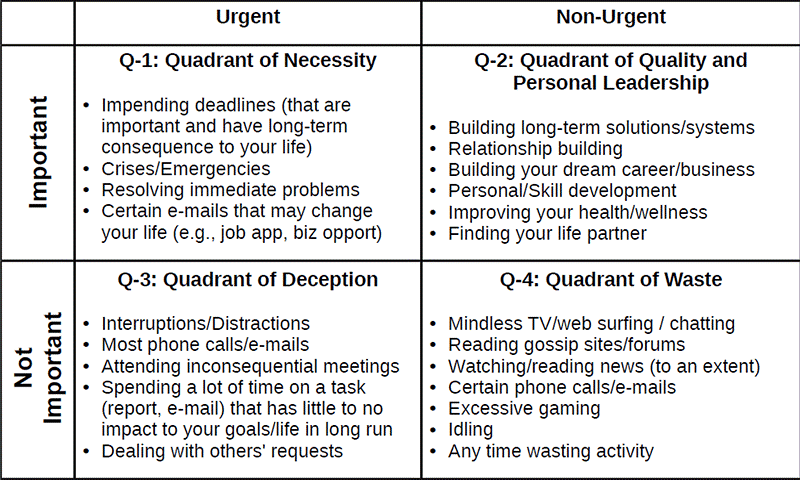Manage yourself over time.
Does time management exist at all? Not exactly – we should rather speak of managing yourself over time. Everybody works in different ways, which is why we will start with defining the notion of ‘working style’.
Working style is a set of regularities determined by, among others, one’s nervous system. The effectiveness of one’s actions depends on it. It develops with an individual and collaborates with their knowledge and experience.
What matters most in life and work are our goals and our ability to define them.
Remember that if you do not know where you are heading you will never reach the destination. It is impossible to achieve a goal without defining it beforehand. Thus, the effectiveness of our actions depends on the proper definition of goals.
While setting out goals, we must stick to the following principles:
The goals have to...
be clearly defined
relate to specific actions
be concisely formulated
be realistic
The goals should be:
1. formulated in a positive way
2. achievable by you, dependent on your actions not external circumstances or other people
3. formulated specifically and precisely
4. defined by indicators that will let you know that the goal has been achieved
5. defined in terms of its duration – you need to have the deadline
6. ecological, which means that you need to be able to see the goal in the context of your whole life and analyse how achieving the goal will affect other spheres of life
7. motivating – achieving the goal should bring additional benefits
8. divided into stages with the first step clearly specified
Unfortunately, some things take us more time than they should. They are the so-called “time eaters” and are able to considerably reduce the effectiveness of your actions. Such “time eaters” may be habits or situations you cannot control and that distract you from doing more important/pressing things. It is crucial that you know that even if you have no control over some things (for example the length of the queue you need to wait in at an office), you can still decide what you will do in such an adverse situation: you may complain and get irritated or start designing your next album cover .
There are two types of “time eaters” - internal and external. The external ones are the situations and/or objects around you that take up too much of your time. The internal ones are connected with the way you manage your time.
External “time eaters”:
- bosses, co-workers and unexpected visitors
- telephone calls – made on your initiative or initiated by others
- meetings and conferences
- searching for information - also surfing aimlessly in the Internet
- social media
- electronic and physical mail
- etc.
Internal “time eaters”:
- the inability to say no
- procrastination
- unrealistic time planning
- indecisiveness
- ineffective communication with others
- lack of discipline
The 80/20 principle is one of the most useful tools in self-management over time. It is called the Pareto principle after its creator, Italian economist, who defined it in 1985. He noticed that contemporary society is naturally divided between “the necessary minority” constituting 20% of the whole, when we take into consideration its influence and wealth, and the “negligible majority” constituting 80% of the whole population.
20% of the time we use is responsible for 80% of our results or 80% of time devoted to doing the task can be ascribed to only 20% of our effectiveness.
Pareto also discovered that virtually every economic activity is subject to the 80/20 division. Pareto’s conclusion, confronted with statistic data revealed that 20% of society possesses 80% of national wealth, in a company 20% of the staff are responsible for 80% of the company’s profit, 80% of all passengers use only 20% of all the train lines, etc.
The Pareto principle should be applied to make our time management effective. It allows us to properly assess the importance of the task we face.
The key to success is not to work as much and as long as possible but to correctly recognise the 20% of actions that determine 80% of our success.
“What is important is seldom urgent and what is urgent is seldom important”
Dwight D. Eisenhower
The priorities we define on the basis of their importance and urgency will help us manage our time more effectively. Time is often wasted on secondary matters and we do not have it for the most important things. The key to effective management of time lies in proper prioritising.
Eisenhower’s matrix
| URGENT | NOT URGENT | |
| IMPORTANT |
TASKS - A To be done personally and immediately! |
TASKS - B Plan! |
| NOT IMPORTANT |
TASKS - C Delegate! |
TASKS - D Avoid! |
A. Important and urgent
Do the task immediately. Because it is so important you need to devote enough time to it. We all need to devote time to from the activities belonging to this quarter, as it is here that we conduct our business and work, use our experience and knowledge to properly react to what happens to us and take up challenges.
B. Important, but not urgent
These tasks should be planned for a moment you will have more time (although you must not delay) or properly delegate the activities to other people. In many cases things that are important but not urgent become important and urgent (tasks A) when you put them, fail to prevent them or do not plan your actions. For activities in this quarter, you should set long-term plans, predict possible problems and ways of preventing them, delegate responsibility to others, and develop your mind and skills. The more time you spent preparing for activities in this quarter the more effective you will be in your actions.
C. Not important but urgent
Do them as quickly as possible, but do not devote too much time to them. Keep in mind that delegating is an important skill when it comes to effective time management. This quarter seems to be similar to quarter A, but in fact it is a “quarter of delusion” as the fuss around urgent activities contributes to the illusion of their importance. We spend a lot of time in quarter C, fulfilling the expectations of others while we are convinced that it is actually activities from the ‘Tasks A’-quarter that are carried out.
D. Not important and not urgent
If the task is neither important nor urgent, why are you doing it? Tasks D are the true “time eaters”.
Time Management – Techniques to Become the Master of Your Own Time
Practice the following techniques to become the master of your own time:
The 4-D Solution (from Megginson and Clutterbuck):
Separate urgent tasks from your most important priorities using the 4-D formula. Can you:
• Dump it – learn to say ‘no, I choose not to do this’. Be firm
• Delegate it – hand some tasks over to others
• Defer it – defer the issue to a later time and schedule a later time to do it
• Do it – do it now if it is an urgent project. Don’t make excuses! Give yourself a reward for completing these projects.
Write it down
Carry a schedule with you and record all your thoughts, conversations and activities for a week. This will help you understand how much you can get done during the day and where your precious moments are going. You'll see how much time is actually spent on producing results and how much time is wasted on unproductive thoughts, conversations and actions.
Timetabling and planning
1. Any activity or conversation that is important to your success should have a time assigned to it. To-do lists get longer and longer to the point where they are unworkable. Appointment books work. Schedule appointments with yourself and create time blocks for high-priority thoughts, conversations, and actions. Schedule when they will begin and end, and most importantly: have the discipline to keep to these appointments.
2. Plan to spend at least 50 percent of your time engaged in the thoughts, activities and conversations that produce most of your results.
3. Schedule time for interruptions. Plan time to be pulled away from what you're doing. For example, appoint time to checking your e-mails (e.g. between 10-11 in the morning).
4. Take the first 30 minutes of every day to plan your day. Don't start your activities until you complete your time plan as the time you take to schedule your time will set you up for the rest of the day.
1. Take five minutes before every call and task to decide what result you want to achieve. This will help you realise what success looks like before you start, and it will slow time down. Take five minutes after each call and activity to determine whether your desired result was achieved. If not, what was missing? How do you put what's missing in your next call or activity?
2. Block out distractions like Facebook and other forms of social media unless you use these tools to generate business.
Be assertive
1. Put up a "Do not disturb" sign when you really have to get work done within a certain timeframe.
2. Don’t answer the phone just because it's ringing, nor read your e-mails just because they show up. Disconnect instant messaging. Keep yourself from instantly giving people your attention unless it's absolutely crucial in your business to offer an immediate human response. Instead, schedule a time to answer e-mails and return phone calls.
Accept
1. Remember that it is impossible to get everything done, do not be too harsh on yourself when you fail to make a deadline if this is caused by external factors.
2. Also remember that 20 percent of your thoughts, conversations and activities produce 80 percent of your results.
Stephen Covey – Time Management Matrix













